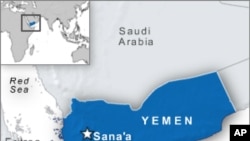Yemeni government troops clashed with al-Qaida militants in the south of the country early Saturday after the group attacked an army base in Lahij province. Heavy casualties were reported on both sides and Yemeni air force planes bombed positions held by the militants.
Yemeni warplanes struck militant positions Saturday after an army garrison along the southern coast, in Lahij province, was overrun. Military officials say the airstrikes and fighting on the ground killed at least 30 people, more than half of them government soldiers.
Al-Qaida militants control much of neighboring Abyan province, and they have made increasingly bold incursions into surrounding areas in recent months. The militants blew up a natural gas pipeline in the south of the country Friday, calling it retaliation for a U.S. drone strike that destroyed a vehicle carrying some of their members.
Political and military turmoil in Yemen during the past year not only forced former President Ali Abdallah Saleh to step down, but also led to the government's loss of control of large swaths of southern Yemen, now in the grip of tribal groups and al-Qaida militants.
Analyst Stephen Steinbeiser of the American Institute for Yemeni Studies stresses it is not always clear whether rival political forces, tribesmen or al-Qaida fighters are behind a specific attack, but that the increased lawlessness is plaguing the country. "Al-Qaida obviously is a term that you have to nuance in Yemen, but it's clear that, however you term it, al-Qaida violence is growing and a kind of lawlessness and vacuum is getting larger, especially in the poorest areas of the governorates of Lahij and Abyan. I think [the militants] definitely are consolidating their grip," he said.
Steinbiser says al-Qaida and its supporters are more powerful now that they control more territory, and also because so much of southern Yemen's former population has been been displaced by the regional upheaval. The analyst also points out that al-Qaida militants have made increasingly bold incursions into areas close to the capital, Sanaa, taking over a mosque in the town of Radan and killing an American teacher in Taiz.
Steinbiser worries that there is little the government can do to counter these trends. "The number of bad apples are growing, because even if you separate these people, it seems these militants are really upset with everyone. And I don't know what you can offer terrorists to get them to not commit terrorism. It doesn't seem to be a tribal thing," he said.
Yemen's new president, Abed Rabbo Mansour Hadi, insisted during his inauguration speech that fighting al-Qaida would be a priority of his new administration. “But,” argues Stephen Steinbeiser, “the drone strikes are not popularly received,” and could be creating a “backlash” against the new government in Sana'a.
Divisions within the Yemeni military are also hampering the government's fight against al-Qaida. Al-Arabiya TV reported that a large group of Republican Guard soldiers demonstrated in front of President Hadi's home Saturday, demanding the payment of back wages.
| Join the conversation on our social journalism site - Middle East Voices. Follow our Middle East reports on Twitter and discuss them on our Facebook page. |




